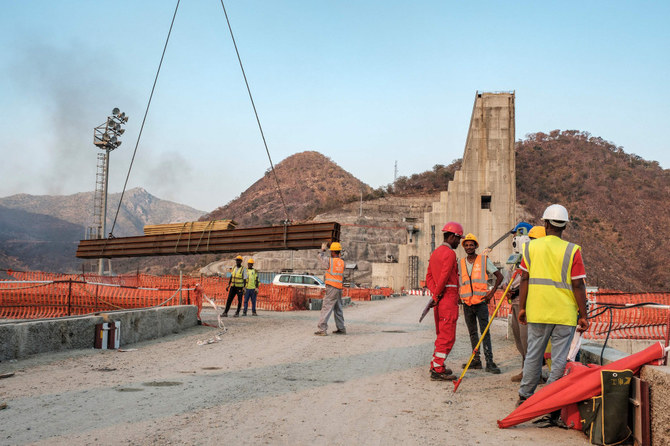CAIRO: Egyptian Minister of Water Resources and Irrigation Mohamed Abdel-Aty on Thursday blamed Ethiopia for the lack of progress in the latest round of negotiations on the Grand Ethiopian Renaissance Dam (GERD).
Ethiopia hopes the $4.8 billion megaproject on the Blue Nile, which is predicted to generate 6,000 megawatts when completed, will allow it to become Africa’s largest power exporter. Both Sudan and Egypt have major concerns about the potential negative effects the dam could have on their own areas of the Nile.
Speaking after a meeting of the water ministers of Egypt, Sudan, and Ethiopia, Abdel-Aty said that Ethiopia had rejected a proposal that the three countries should reach a binding agreement in accordance with international law. He said Ethiopia’s position was to agree on guidelines only, which could later be unilaterally amended by Addis Ababa. Negotiations over GERD first began almost 10 years ago.
“Ethiopia sought to reach an absolute right to establish projects in the Upper Blue Nile,” Abdel-Aty said. “Moreover, it refused (to agree) that the GERD agreement (should include) a legally binding mechanism to settle disputes. Ethiopia also rejected (a proposal) that the agreement (should) include efficient measures to respond to droughts.”
Abdel-Aty added, ”Egypt participated in the recent round of negotiations, called for by the brotherly nation of Sudan, with good intentions, in order to exhaust and explore all the available methods to reach a fair and balanced agreement on GERD in a way that would preserve Ethiopia’s developmental rights out of this project while minimizing the negative effects and damages caused by GERD on the two downstream countries. However, Ethiopia unfortunately continued its intransigent stances.”
Ethiopia’s intransigence on GERD negotiations has also raised concerns in Sudan. The Sudanese Ministry of Irrigation issued a statement saying, “Despite the progress achieved in technical issues pertaining to filling and operating the dam, disputes pertaining to the legal aspects revealed real conceptual differences among the three parties on a number of issues, (including) how binding the agreement is, a dispute settlement mechanism, and disconnecting the agreement from any other agreements since the current accord is supposedly on filling and operating the dam, not on dividing the water shares among the three countries.
“In light of such developments, the Sudanese delegation requested referring the disputed files to the prime ministers of the three countries to reach a political consensus on such files in a way that would provide the political will needed to resume negotiations as soon as possible following consultations between the ministers of irrigation of the three countries,” the statement continued.
In a seminar held by Sudanese Minister of Irrigation Yasser Abbas, Siddiq Youssef — a leader of the Alliance for Freedom and Change (ALC) and of the Sudanese Communist Party — called on the Sudanese government to ensure that a compensation clause for any ecological or social damage resulting from the GERD project is included in any agreement.
The former Egyptian Minister of Irrigation Mohamed Nasr Allam told the press that the failure of GERD negotiations indicates that Ethiopia has reached “a high level of bullying” and said it was important that Egypt and Sudan be privy to records of the transcripts of the sessions.
Allam added that Cairo and Khartoum should coordinate their approach to the negotiations. He called for both parties to resort to the UN Security Council and to use other ways to “internationalize” the issue.
Ethiopia, he said, does not have a real political will to make a success of the negotiations. “It was targeting the international community and trying to prove to observers that it was serious in negotiations. However, even this objective was not achieved,” Allam said.
Sudanese political analyst Mohamed Adam Isaaq said that any attempt to remove Sudan’s lawful right of partnership in the GERD project would be unacceptable. Sudan is a “main player, not a mediator,” he said, pointing out that the country could be exposed to negative effects — as well as benefits — from the project, including the decline of the water level in the Nile, and a decline of silt, which would deprive Sudan of natural agriculture on the river’s banks. Fishery resources would also be depleted, he claimed.
Egypt, which is almost entirely dependent on the River Nile for fresh water, fears the dam will diminish its water supply, which is already worryingly low. Some 85 percent of the Nile water that reaches Egypt flows from the Ethiopian highlands.























